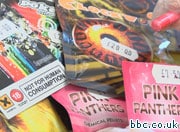A law banning ‘legal highs’ has come into force, with the Government saying it wants to do “everything we can to eradicate this abhorrent trade”.
Karen Vandersypen, whose 20-year-old son died after taking a ‘legal high’ welcomed the law, but said it was sad that “such a high price” had already been paid.
‘Legal highs’, also called new psychoactive substances, mimic the effects of banned substances such as cannabis and heroin, but have previously been sold openly on the high street.
‘Not heavy-handed’
The Psychoactive Substance Act came into force at midnight and outlaws “any substance which is capable of producing a psychoactive effect in a person who consumes it”, with a few exceptions, including alcohol and caffeine.
Under the Act, those involved in the supply or production of the drugs face a prison sentence of up to seven years.
However, the police officer in charge of the issue has suggested officers may take a weaker approach. Commander Simon Bray said there are “all sorts of options around problem-solving in a proportionate way, so it’s not too heavy-handed on the more social end”.
Ruined
Other measures within the Act allow police to clamp down on ‘headshops’, outlets for ‘legal highs’, with up to two years in prison if people fail to comply.
these drugs are not legal, they are not safe
Karen Bradley
Critics have said the ban could send the sale of the drugs ‘underground’, but the Government says it wants to take all possible steps to stop people taking the substances.
Karen Bradley, Minister for Preventing Abuse, Exploitation and Crime, said: “Too many lives have been lost or ruined by the dangerous drugs formerly referred to as ‘legal highs’.
Clear message
“That is why we have taken action to stamp out this brazen trade.
“The Psychoactive Substances Act sends a clear message – these drugs are not legal, they are not safe and we will not allow them to be sold in this country.”
Alongside the legislation, the Government said it would “continue to take action across education, prevention, treatment and recovery in order to reduce harmful drug use”.
Karen Vandersypen’s son, Jimmy, had a heart attack after taking a form of synthetic cannabis in 2014. She told BBC Radio 4 that she was “absolutely delighted” that the law had come into effect.

